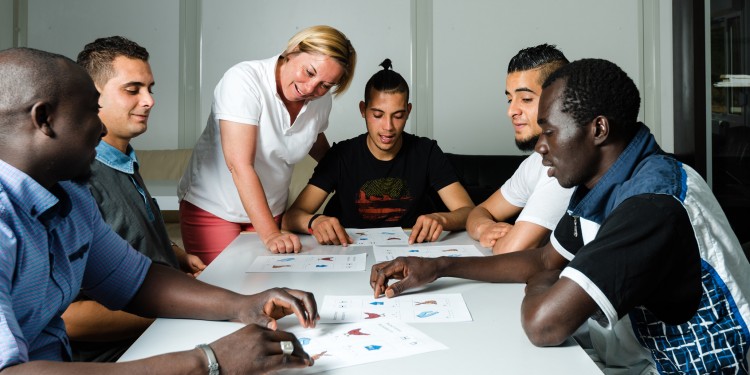
A refugee’s personality is a factor that decides how successful integration is
Refugees who are more willing to take risks, who tend to reciprocate friendliness, and who are more strongly convinced than others are that they are in control of their lives integrate into society faster. This is the result of a study undertaken on the basis of the “IAB-BAMF-SOEP Survey of Refugees in Germany” which researchers from the University of Münster, Saarland University and the Socio-Economic Panel (SOEP) at the German Institute of Economic Research (DIW) devised. The study was published recently in the “Collabra: Psychology” journal.
The “IAB-BAMF-SOEP Survey of Refugees in Germany” is the largest representative longitudinal survey of refugees who came to Germany between 2013 and 2016. In order to determine which factors contribute to successful integration, the researchers evaluated the data of more than 4,000 participants in the study who had already been living in Germany for an average of 18 months at the time the survey was carried out.
“Our study demonstrates for the first time that, in addition to socio-demographic factors, it is also individual personality traits which play a decisive role in any successful integration of refugees,” says psychologist Elisabeth Hahn from Saarland University, the lead author of the study.
According to the study, refugees who are more willing than others to take risks, for example, find work faster and have more social contacts with local residents. Those who are more strongly convinced that they are in control of their lives and who reciprocate the friendliness shown by other people find it easier to make inroads into society than others do. They have more friends and are more self-confident, more contented and healthier.
The – frequently traumatic – experiences undergone while fleeing, and the unfamiliar circumstances in the new country, place a heavy burden on refugees. “But if people are convinced that they can influence their fate,” explains SOEP researcher David Richter, “they have a far greater scope for action than if they think they are at the mercy of their circumstances.” “Also, a general tendency to take the occasional risk, and to reciprocate people’s friendliness, seem to be helpful in the difficult process of integration,” adds Münster University’s Mitja Back, an author of the study.
The study also confirms a series of findings arrived at in earlier studies on the integration of immigrants – findings which also hold true for refugees who have recently arrived in Germany: “People who have been living in Germany for a longer period of time find it easier to integrate than others,” says Jürgen Schupp, Deputy Director of the SOEP. A better knowledge of German and a good level of education acquired in their home country also help decisively in making integration succeed. Gender also evidently plays a role: Female refugees are less frequently employed and they have fewer social contacts.
“Religious affiliation of the participants – whether Islam or Christian – was not related to the extent to which refugees are integrated,” adds Mitja Back. “This contrasts with the prejudices commonly found in host societies“.
Refugees who wish to live in Germany permanently currently find support in various areas of life – for example, in acquiring language skills or in looking for work. Based on the findings, the authors of the study also call for refugees’ individual personality traits to be taken into account in integration programmes. “Help for refugees should also include supporting and encouraging the personal resources and social skills which these people bring with them – for example, the ability to make new contacts with other people,” says Elisabeth Hahn.
Original publication:
E. Hahn et al. (2019). Predictors of Refugee Adjustment: The Importance of Cognitive Skills and Personality. Collabra: Psychology, 5(1), 23. DOI: 10.1525/collabra.212
